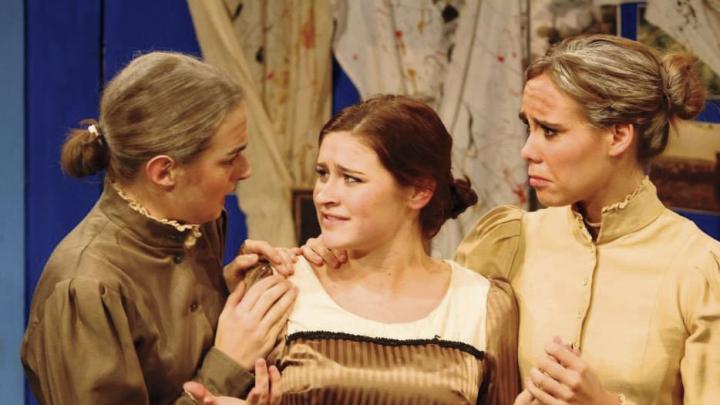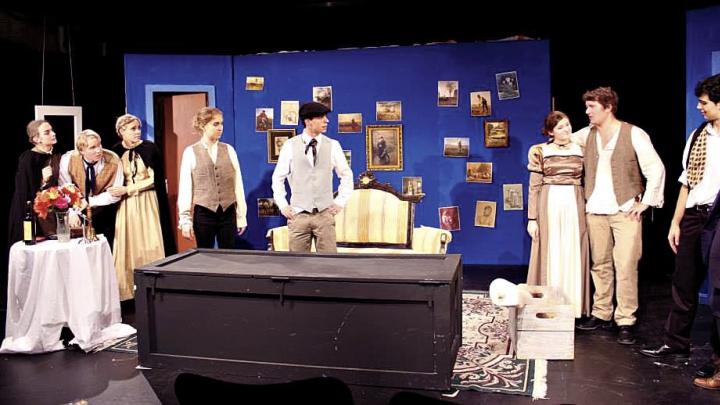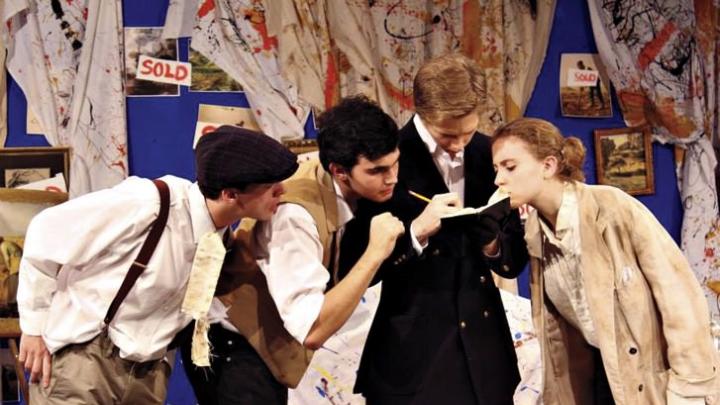The Google Calendar listing the conflicts for cast members looks terrifying. One has a class section from 6 to 7 p.m. on Mondays and Wednesdays, two others have a cappella rehearsals from 7 to 10 p.m. on Tuesdays and Thursdays, and a fourth is in another play that demands he attend six hours of rehearsal each day next week. I squint at the slivers of white space among the rainbow of “unavailable” blocks, the spaces in which I am justified in asking my stage manager to call the entire cast for rehearsal. I thought being a stage director would let me control my time better than when I was a performer at the mercy of someone else’s rehearsal schedule. Instead, my time is now dictated by everyone else’s. I want Google to engineer a magical eraser that I can use to blot out the chromatic conflicts…
It was sophomore fall, and I was quickly realizing the complexities of my role as director of an undergraduate play. As a freshman, I had been involved in four productions, all acted, produced, and directed by students, and I was eager to take on the responsibility of a full-scale production myself. When application season for theater venues rolled around that spring, I teamed up with friends who had agreed to produce and design Mark Twain’s play, Is He Dead? for the following fall. We talked about the production in the way I imagine people plan utopian communities: we would use minimal props, simple set pieces, and throw weekend cast parties galore.
At Harvard, staging a show requires production teams to find sources of funding and create set plans, costume designs, and lighting concepts before they can even apply for space. We decided to apply for the “Ex” (the Loeb Experimental Theater), a black-box performance space in the Loeb Drama Center. Though I knew it was highly coveted, given its versatility and proximity to technical resources, I dutifully compiled a 35-page application of statements, résumés, and design plans, and felt confident after my 30-minute interview. Ultimately, my show was rejected for the Ex, but we soon found a home, via a second application, at the Adams Pool Theater, an actual swimming pool converted into a theater in the late 1980s. During the summer, I gleefully returned to daydreaming about glowing Crimson reviews and meticulously detailed blocking notes.
The first week of each semester at Harvard is marked by the stress of choosing classes, but for students either casting or auditioning for shows, the real back-to-school pressure happens from 6 p.m. to midnight on the very same days. “Common Casting” is when the majority of productions on campus assign roles to performers. Because more than 40 shows can go up in any given semester—from the Ex, to dining halls, and even squash courts—there are often too few actors to go around, and some students end up being involved in more than three shows.
After more than 20 hours of auditions during the first six days of my sophomore fall, I finally had my cast, and was ready to begin rehearsals. Ready, that is, if I could ever find a time to schedule them. My idyllic visions never included staring at that Google calendar with four weeks left to rehearse a two-hour play requiring almost 100 props, 13 actors, 18 costumes, three wooden scenery flats, and $1,300 in grant money. I took a deep breath, and set about cramming as much rehearsal as possible into the brief time allotted.
I often found myself awake at 4 a.m. before a morning rehearsal, scribbling blocking notes into the blank margins of my script. I spent every spare moment e-mailing about paint colors and building supplies, and ran to the props room at lunchtime to pick out the perfect couch or set of glasses before another show claimed them. Homework was usually completed between the hours of midnight and 10 a.m., and the amount of coffee I consumed was directly proportional to my lack of sleep. I once took the T through Boston for three hours in search of a self-inflating whoopee cushion for one particular bit in the show, only to finally find the elusive toy at a Walgreens in Allston, a 10-minute bus ride from my dorm.
Directing became a series of successes and failures, each one the product of inexperience and learning by trial and error. Despite their strain on my sleep and homework, I lived for the hours of rehearsal I’d painstakingly planned. Seeing something I had only imagined acted out under the harsh fluorescent lights in a rehearsal room filled me with a kind of glow nothing else could spark. Yet that was nothing compared to how proud I felt seeing my actors, now a new group of friends, take control of all we had worked on when an audience packed the house on opening night.
I love theater for the micro-communities each show creates, especially as opening night draws near. The worst technical difficulties or missed lines during a performance can become the “Do you remember?” moments that hold a cast together long after the set has been struck. When it comes to performing in front of an audience, terror necessitates a close cast bond—nail-biting director in the last row of the audience included.
Is He Dead? received a beaming review in the Crimson, and we did have exuberant cast parties, now immortalized by disposable camera photos in which the post-show relief of the subjects is evident by tired, sweaty smiles. The satisfaction I gained from this first foray into directing made me realize that I love the kind of theater Harvard offers outside the classroom, where students are given total autonomy over creative decisions. When plans of study were due just a few weeks later, I chose to separate my academic pursuits from extracurricular activities. Though many of my friends chose to pursue the secondary field in dramatic arts, I happily picked courses in English and psychology.
The recent announcement of a likely full-scale concentration in theater, dance, and media (see “The Campaign Computes”) has left my friends and me with many questions about the future of our existing dramatic community. Would concentrators receive preference in the space-application process? Would it become possible to earn course credit for participating in shows—and if so, would this apply to all actors and production staff, or just to those with the biggest roles? Would the larger creative processes, such as choosing what shows to mount or what kinds of sets to build, remain in student hands, or would faculty members begin to exercise more control? Given the competitive nature of the real-world theater industry, the opportunity to exercise this kind of control at such a young age, in an environment that provides funding and support, is invaluable to the development of practical theatrical knowledge among undergraduates. Most important, what degree of independence would student-produced extracurricular shows retain?
My graduation, two semesters away, looms closer than the answer to these questions. I hope the coming changes to the Harvard theater community will further the abundance of talent and resources on campus, and not inhibit creative freedom. Being given the funding and the space to direct a favorite play at 19 years old is a dream I hope students are able to fulfill long after I’ve been released into the “real world.” All I ask of administrators is that they let students guide these new opportunities in the way they’ve learned best in years past: through direction.










